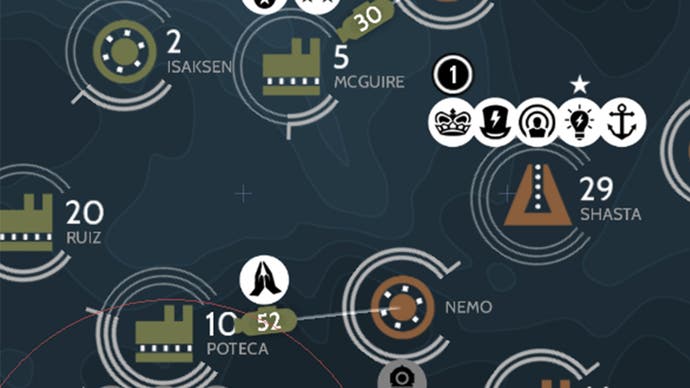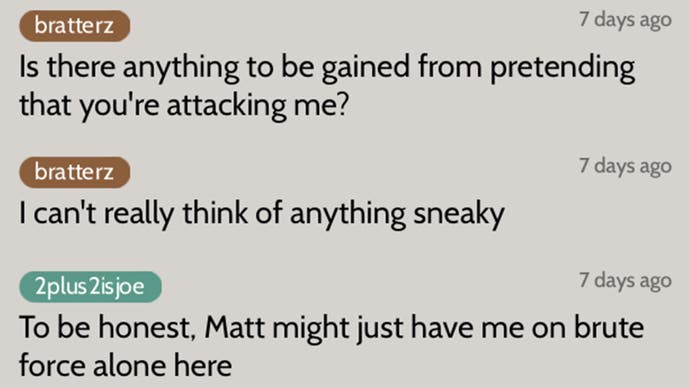Ten days of Subterfuge
Better played without friends.
Subterfuge, available on iOS and Android, is a game about deception and submarines, which makes its name absolutely perfect, doesn't it? Heavily inspired by the likes of browser-based backstabber Neptune's Pride, a full game lasts somewhere around a week and has eight people forming the most fragile of alliances in the hopes of personal gain. You see, only one person can ever 'win' a game of Subterfuge, which means that whenever an agreement is reached between two players, it has to be a temporary one at best. The trick is figuring out how to come out on top when things do eventually, inevitably, fall apart. This makes for a brilliant and incredibly tense experience - one that in hindsight, I wish I'd played with a group of total strangers instead.
I first realised there might be an issue on day two of our campaign. A neighbouring player had left our border somewhat unguarded and I decided to seize the moment, hoping to snatch a valuable factory before she could react. Moving between outposts in Subterfuge can take upwards of 12 hours, but I'd scheduled the attack to begin in the very early hours, hoping to cover most of that distance before anybody realised what was happening. This is how Hannibal must have felt as he looked upon the Alps, I'm sure, knowing the Romans could never expect such boldness. I went to bed that night confident in my scheming and awoke to a message that read "Why are you attacking me? Explain yourself, FRIEND." Worse than the unnecessary capitalisation, it was now obvious that I'd underestimated my opponent's defences. We were both set to take heavy losses in just a few hours time and I had no way of cancelling my attack. This could set me back.
With only one option left, I tried to talk my way out of what was about to happen. "Oh gosh, I'm sorry", I replied, "I didn't mean to attack you. Can we please work this out?". Hannibal, I was not. And yet somehow, an interesting compromise was made: if I agreed to immediately return the factory after claiming it, my opponent would pull her forces back and ensure that neither side took any unnecessary losses in the process. Or in other words, I was capturing a really important outpost in the middle of enemy territory and it wasn't going to cost me a single submarine. This was an excellent play, a perfect start. All I needed to do now was break our promise and keep the factory for myself. I'd played a bunch of Neptune's Pride at this stage and this is exactly what these games are all about. Skullduggery is to be expected, y'know? But I just couldn't do it.
Instead of taking an early advantage, I returned the factory and apologised several times along the way. It turns out it's more difficult to betray someone when you might have to sit across from them in a pub at some point. But the game is called Subterfuge! We're going to need to cross that line at some point, right? Right. That would happen just a few hours later.

Really, the biggest mistake you can make in a game like this (other than giving back an unguarded factory, like an idiot) is to look like you might be winning. This happened to one rather unfortunate player who had managed to capture two or three additional outposts in the opening few hours of the game. Sensing his precarious position, he'd reached out to me a couple of times by this stage, always careful to be polite and unthreatening. The problem, however, is there's a stats page for everyone to look at and that stats page was now saying he was taking the lead. Just as that idea started to creep into the back of my mind, his neighbors began messaging me too. "Isn't our friend doing well?", they'd ask, "Have you seen his stats?"
Now one of the stranger things about playing both Subterfuge and Neptune's Pride, in my experience, is that you'll rarely see players admit publicly to attacking each other for personal gain. There's almost always a different reason instead. If you're attacking others for your own benefit, then people might start to think that you're trying to win the game, and nobody ever likes to give that impression. So seeing another player start to take the lead can be an incredibly useful thing. As my allies and I would be quick to point out, we weren't attacking him because we wanted to win. We just needed to stop him from winning himself. That's an important distinction. This would be our casus belli.
And so he was the first friend I attacked in this game of Subterfuge - and it quickly began to feel a bit more personal than I was expecting. When you play a game with a time commitment like this, it's difficult not to find yourself more invested in its outcome. For some reason, the player in question just hadn't expected me to turn on him and so I soon became the villain in his mind. If only I hadn't cheated him he'd still be in with a shot, I imagine he told himself. His messages soon lost their pleasantries, replaced with blunter warnings and eventually some brief but genuine anger. That sort of knocked my enthusiasm.
But we were winning, I guess! Although that's not how this game works at all. Everyone's in this for themselves, we've already gone over that, and actually one of the other players in this alliance of ours was starting to pull ahead himself.

It's funny how the second betrayal felt easier than the first. I guess that's because I didn't attack him personally, but instead arranged a private truce with the very player we'd be warring against, providing some of my own submarines to sweeten the deal. If he kept attacking our former ally, then we would stop taking his territory. You know in hindsight, that sounds a lot like intimidation.
I envy the people that stopped playing at this point, as things started to take a turn. A couple of players - realising that they were unlikely to win, or just not having a whole lot of fun - decided to quit. Despite the assurances that you can check in just once or twice per day, Subterfuge can end up being one hell of a time investment, but more than that, I wish I could have left unscathed. I know Christian Donlan always has a decent quote to share in his features, but I'm going to go with The Dark Knight's Harvey Dent here: "You either die a hero, or you live long enough to see yourself become the villain." I understand the point he was trying to make now, I think.
Our first game of Subterfuge would go on to last a gruelling ten days. I would betray again and see myself deceived in return. I'd have private messages leaked by a former ally and need to contend with a laundry list of false rumours. At some point I'd make the dangerous mistake of looking like I might be winning and strangely enough, I'd absolutely trust another player to keep me in the game when that happened. For a game that's won and lost by pushing numbers with my thumb, things got kind of intense. As the campaign reached its end, we must have individually racked up hundreds of messages to allies, enemies, and whatever comes in between. Subterfuge has an excellent system in place for this and it really needs it - communicating outside of the game is clearly an option, but seeing another player online and being able to immediately jump into a private discussion is absolutely crucial. And yet, as our game concluded, despite all of that prior communication, all of that intrigue and compromise, most players just seemed in a rush to put it all behind them. The public chatroom saw a few updates with the expected congratulations and a forced joke or two, but then just silence. I don't know how I wanted this game to end, but I think I'd been hoping for more than a sense of shared relief. This is one hell of a strategy game, it really is, but man, I found it exhausting to play alongside people that I liked.
Subterfuge. It's better played without friends.

